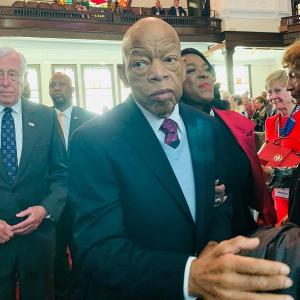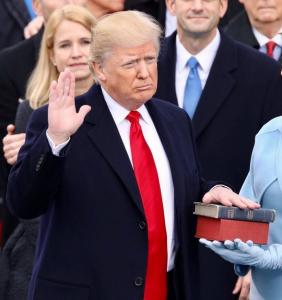 I was especially struck by the interview that President Trump conducted recently with the journalist, Jonathan Swan, for several notable reasons. The president rarely strays outside of the Fox News shell, always ready to respond to those who in general favor him and his policies, and seldom anxious to lob arguments with those who are not inclined to agree with him on most things. Perhaps this is not a completely unusual experience with US leaders or anyone else; who enjoys speaking publically with those who may prove our adversaries rather than our friends? I do not know the full history of Mr. Swan’s relationship to Mr. Trump, but in the course of the interview it was stated that this was not the first encounter between the two men. Swan is an Australian-born reporter, 35 years old, born into a journalistic family. I found him in this encounter at least fully professional, uncowed by the power of the presidency, and dogged in his attempts to pry the truth from the president as well as he could.
I was especially struck by the interview that President Trump conducted recently with the journalist, Jonathan Swan, for several notable reasons. The president rarely strays outside of the Fox News shell, always ready to respond to those who in general favor him and his policies, and seldom anxious to lob arguments with those who are not inclined to agree with him on most things. Perhaps this is not a completely unusual experience with US leaders or anyone else; who enjoys speaking publically with those who may prove our adversaries rather than our friends? I do not know the full history of Mr. Swan’s relationship to Mr. Trump, but in the course of the interview it was stated that this was not the first encounter between the two men. Swan is an Australian-born reporter, 35 years old, born into a journalistic family. I found him in this encounter at least fully professional, uncowed by the power of the presidency, and dogged in his attempts to pry the truth from the president as well as he could.
As always with President Trump, the interview of some 25 minutes was wide- ranging, sliding quickly from subject to subject. After a rather lengthy discussion of the pandemic and the US response to it, with Mr. Trump attempting to convince Swan that his response to the virus was extremely good, and with Mr. Swan returning several times to the fact of 1000 US deaths each day as a sign that things were in reality not quite as “under control” as the president continued to say, the reporter turned to a very different subject. And in that subject I was immediately on the one hand captivated and on the other horrified. That subject was the recent death of the civil rights lion, John Lewis, 33- year congressman from Georgia’s 5th Congressional District, dead at 80 from pancreatic cancer. By any light, Lewis, who was beaten nearly to death after a walk across the infamous Alabama Edmond Pettus Bridge in Selma accompanying Martin Luther King, Jr. and a host of peaceful protesters, and spent countless nights and days in one jail or another for his activities for justice, was universally seen as a stout champion of African- American freedoms as a part of the constant struggle for equality for all peoples in the nation.
Swan asked the president a very simple question, providing a kind of “softball” that any leader relishes, allowing him to demonstrate in his answer if not his deep gratitude for Lewis’s life, at least offering him a chance to show his knowledge of and conviction for a life well-spent in the cause of justice. “What is your reaction to the life of John Lewis,” Swan asked? Mr. Trump answered, “I don’t know. There have been many who have been involved in the work of justice. He didn’t come to my inauguration, you know. That was his right, but he did not come.” The president repeated that fact at least twice more in his reply. Of course, Mr. Trump did not attend Lewis’s funeral, citing too much work, nor did he walk to the Capital rotunda to pay his respects to the first African American to lie in state there. It seems obvious from Mr. Trump’s response to the question that Lewis was hardly worthy of the president’s time, primarily because he chose not to attend his inauguration. Here is extreme pettiness and revenge on full display. I have found more than a few things cringe-worthy in the words and actions of Donald Trump over the past 3 1⁄2 years, but that reply to that question may have been the most appalling of them all. “I cannot say much about his lifetime of work for justice, and I certainly will not give him any of my valuable time now that he is dead.” That is about as close to a public middle finger as any president could ever flash to a fellow human being.
And a famous biblical story came to my mind. Jesus and his disciples wandered the Galilean countryside, in the far north of the Roman province of Palestine, and one day found themselves near some villages of Caesarea Philippi. During the walk, Jesus quizzed the disciples. “Who do people say that I am?” The disciples, eager pupils all, provided quick replies. “John the Baptist, some say; Elijah, say others; one of the prophets many have said.” “What do you say?” Jesus says pointedly, which seems to be what he was really interested in. The old fisherman, Peter, puffs up his leather lungs and fairly shouts, “You are Messiah!” Jesus immediately tells them all not to breathe a word of that to anyone. And after the disciples are struck mute by that demand, Jesus proceeds to tell them that he must suffer and die at the hands of the priests, elders, and scribes, saying this plainly and openly. And the same Peter grabs Jesus by the lapel and drags him over away from the rest of them for a stern talking to. This act is not a simple one, and the reason for it is complex. Peter surely does desire the death of Jesus Messiah, but equally Peter does not desire the death of Peter! We have hooked our star to yours, Jesus, and I did not sign up for this gig to end up dead! And for that rebuke, Jesus calls Peter Satan, about the worst thing anyone might call a person in 1st century Palestine.
You really want to be my disciple, asks Jesus, and one can imagine the disciples all ears now, eager at last to get some sort of straight answer out of the unpleasantly enigmatic Jesus? And so here is the answer to discipleship with Jesus. “Deny yourself, take up your cross, and follow me.” The first step is of course the most difficult; deny yourself. Notice that he does not say “denigrate yourself” or “put yourself down” or “pretend you are just no good.” To deny oneself is to think of someone else first, to attempt, however, hard as it may be, to put yourself in someone else’s shoes. And there, apparently, is exactly where Donald Trump cannot seem to go; he appears to be personally incapable of getting beyond his own self as he finds his way in the world. Would it not have been grand if he and Melania had walked together to the rotunda and stood in silent respect over the body of John Lewis, even for a few moments, a man who surely was not the president’s friend, yet was a hero for justice and freedom in the country the president was elected to serve. By doing so, Mr. Trump might have signaled to the nation that in death it is time to show honor to those who have labored for the good of the nation, even if, especially if, that labor was hard-fought and recognized as significant and nearly unprecedented. The spotlight was rightly on Congressman Lewis, and by allowing the light to remain there, President Trump could have shown that he did not always have to be the center of everything, and that by honoring Lewis, he was not in any way dishonoring himself.
Yet, it appears to be Mr. Trump’s cross that he cannot pick up, that willingness to honor another, to deny self and to think of another before himself. He may march to any number of churches and heft a Bible high as a sign of his adherence to what that Bible’s pages urge on him, but unless and until he can find any measure of self-denial he will never be any sort of follower of the one that Bible describes, and neither will you or neither will I. I found his reply about John Lewis to be pathetic and weak and disgusting, and a missed opportunity to be something like a real president of all the US. And in the end I find Mr. Trump a tragic figure, plainly unprepared personally and professionally to grasp the duties of his high office, and I can only hope that his time as president ends with a resounding rebuke by the American people in November. I do not wish that with any kind of triumphant pleasure, but desire it with genuine sadness for the pitiable emptiness that his time in office has created in our country.












